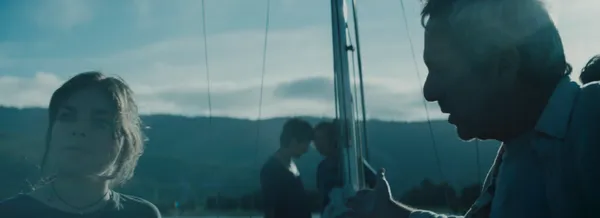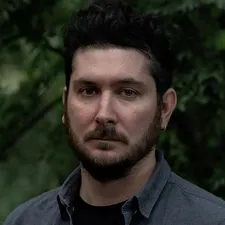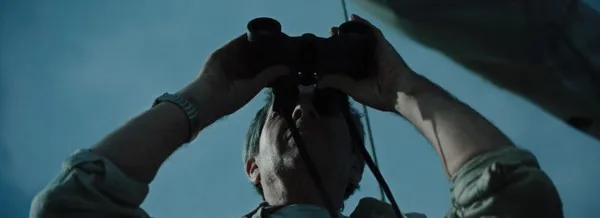 |
| Nicolas Postiglione: 'One of our main hopes was for it to be equally balanced, that you could be the daughter or the father' Photo: Courtesy of POFF |
Immersion marks the first feature from director Nicolás Postiglione, who picked up a Special Jury Prize for his arthouse drama/thriller hybrid at this year's Tallinn Black Nights Film Festival. The film sees tensions reach boiling point between a father and his daughters Tere (Consuelo Carreño) and Claudia (Mariela Mignot) after he at first refuses to help a boat of local lads who appear to be in difficulty. The film becomes increasingly gripping as the family returns to help as the ambiguity surrounding the men Michael Silva and Alex Quevedo) on the smaller boat increases. In the first part of our sit-down interview with the writer director, we talked about the location of the film, shooting on the water and maintaining ambiguity over where the audience's sympathies lie. Look out for the second part of our interview, coming soon, in which he talks about collaborating with fellow Chilean directors Moisés Sepúlveda and Agustín Toscano on the script, casting and working with Alfredo Castro.
Amber Wilkinson: Did you know the place where you're going to shoot it when you were writing it?
Nicolás Postiglione: We started looking for lakes, and this one came up and we liked it because it was a bit more swampy. Other lakes in Chile are a bit more pristine and looked like something from the Lord of the Rings, with a volcano, beautiful, tall trees. But this was more like a thriller Lake. The water wasn't this beautiful crystal blue water, it was kind of green and brown. And the grass that kind of waves around the movie was something that we liked. Also, it wasn't full of boats, it was kind of empty, because this is actually one of the places where the Mapuche conflict actually takes place. So yeah, even like after the shoot, there was terrorist attacks happening, or supposed terrorist attacks, no one really knows who does this. But they were burning houses around right, right around the background of the film. So that has added something to it. And there's not really any boats, you don't see jet skis going on. So the loneliness was something that helped.
AW: Your film has dual tension - between the kids on the boat and the family on the yacht but also within the family itself. And I wonder where you started with the idea for the film? Did you start with the idea of the big picture or the family picture?
NP: Well, the first idea was running into a bunch of people who needed help and deciding not to help them based on their looks and on the feeling they gave you. So that was like the first thing that came out of our head. And then we tried to deconstruct it as to what comes before and what comes after, and that's when the family tension of the daughter and the father started to grab thicker inner problems. It was built to be functional to that one twisting and turning point, which is when Ricardo (Alfredo Castro) first sees the people in need of help. But we feel that it's also maybe evenly important. Because it's not only a movie about class struggles and different social economic groups trying to find the balance, but also generational differences.
AW: The generational attitude really comes across in the film. The girls are much less naturally frightened of the boys in the boat than their older father.
 |
| Nicolás Postiglione Photo: Courtesy of POFF |
NP: Yeah, the thing is, there's something about the younger generation, who have more tolerance towards sexuality, class - they have this open mindedness while maybe older generations are way more conservative. With every year that passes, the kids are ever more open to new stuff. I think it's something that is normal among generations but, obviously, here we twisted it enough for it to be a problem within the film.
AW: The only thing that's greater than Ricardo’s fear of the other, if you like, as represented by the kids in the boat, is his fear that his daughters somehow will not respect him and think that he's a coward.
NP: It's funny. It's about bad decisions. Probably, he wouldn't have got into so many problems if he would have just paid less mind to what his daughters think about him. He's trying to live up to his daughters’ expectations. And they're always punching him in the stomach, accusing him of poor fatherhood and poor humanity. These kinds of things pierce him enough for him to try to solve it with actions.
AW: There’s a real ambiguity in the film, I think it's very finely poised as things rock back between the kids in the boat and the family.
NP: As a part of the audience, you could take the daughter’s rail, or the father’s rail. But I think maybe we might have overdone the thriller part of it because eventually most people take the father's side. But one of our main hopes was for it to be equally balanced, that you could be the daughter or the father. We tried to fit people into either one of those boxes and for the people the audience to decide would have been a great experiment and a great exercise.
AW: How was shooting the film itself, because so much of it takes place on the water?
NP: It was a terrible decision. This is all really shot on the water, we had three or four boats, from bigger to smaller ones, one that did taxi duties and others that had camera duties. And it was just us standing on another road trying to balance out and get them into the shot before the sun came in and everything was spinning and turning. It was actually really hard. Added to that it was only 16 days of shooting, which if you don't know, it's for a 90 minute film is very few days. So we had to be very accurate.
AW: Also, you shoot in the half-light, you start and it’s bright daylight but, as the film progresses the day is wearing on into night.
NP:Yeah, the scheduling went kind of moving towards the night. So we would start in the morning and end during the day but on the last days of shoot, we would start in the afternoon and progress into the night. We shot it pretty chronologically. We started off with the house scenes because everyone's been on a shoot on land, everyone knows how to shoot inside a house. So we had three or four days to get warmed up. And then the fifth day was the first day – but not even on the water, it was on a pier, and the boat had come to a stop. And just to make that easy action, it was like, “Holy shit, what have we got ourselves into”, because the boat wouldn't stop because boats don't have any brakes.
That first day we had to do like 10 shots - and we came back with two, like kind of done. So along the way, we tried to figure out ways to make it easier less fragmented, less cuts, less shots, just try to loosen it up. If I had to do it again, I do even fewer shots because it would have given the actors a bit more space to develop and have given me a little bit less stress directing it.
AW: It's interesting, you talk about the house scene, because I thought one of the most interesting things in the film is the scene in the house, where Tere catches her head in the spider's web. Because in a way, it's an absolute microcosm of what you laying out in the film, which is she has an irrational fear of spiders. The second she even thinks that she is near a spider, she absolutely freaks out, which is basically more or less what her father will do later over his own irrational fear.
NP: I hadn't really drawn it out that way. But it's funny that you say that, I think it works perfectly just as you described it. It's like, you're scared of something, but you try not to be until it's right in your face, and then you can hide your fear.






















